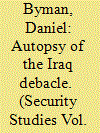| Srl | Item |
| 1 |
ID:
085116


|
|
|
|
|
| Publication |
2008.
|
| Summary/Abstract |
This article examines whether the outbreak of an insurgency after the U.S. invasion of Iraq was an avoidable policy failure or whether the structural conditions surrounding the occupation made such an outbreak inevitable. Several U.S. policy mistakes, in particular the deployment of too few troops, a lack of comprehensive political and military planning for the occupation, disbanding the Iraqi military, the failure to establish a government in waiting, and overly aggressive de-Baathification, greatly exacerbated rather than ameliorated the various structural problems. More fundamentally, structure and policy choices interacted at all levels to explain the Iraq failure. The unavoidable conditions that coalition forces encountered in Iraq-a divided society devastated by years of war, sanctions, and misrule-and the political context in the United States made the challenge for successful policy execution difficult. This structure constrained and delimited the options open to U.S. policy makers but, even within those narrow limits, the United States made many bad choices that further diminished the chances of success.
A particularly important series of policy mistakes occurred well in advance of the buildup to war itself. The orientation of the U.S. armed forces away from counterinsurgency, the failure to establish a political settlement before invasion, and other controllable policy choices in the prewar period all led to enormous difficulties during the occupation itself. Thus, by the time of the invasion, these policy choices had become almost like structural constraints and the failures had a snowballing effect, making policy corrections far more difficult.
|
|
|
|
|
|
|
|
|
|
|
|
|
|
|
|
| 2 |
ID:
138502


|
|
|
|
|
| Summary/Abstract |
This paper suggests that we may learn much about mainstream doctrines and practices of governance from watching what happens when they engage with international development issues. Cambodia is an illuminating example. Despite apparent material, organizational and intellectual superiority, Western engagement with poor countries often fails: Cambodia points us towards possible explanations as to why. The paper suggests that the lack of success in development intervention has had much to do with patterns visible in Western policy and governance doctrines: a desire to base the organization of interventions on cause–effect principles; an associated reckless application of imagined generic cause–effect relationships with little robust empirical foundation; and associated tendencies towards sectarianism.
|
|
|
|
|
|
|
|
|
|
|
|
|
|
|
|
| 3 |
ID:
088390


|
|
|
|
|
| Publication |
2009.
|
| Summary/Abstract |
This study provides a complement to the structural understandings of labor market polarization in South Korea by highlighting its policy-related aspects. It argues that there have been considerable policy failures by the Korean government, which have offset any possible positive effects of new redistributive and anti-poverty policy measures.
|
|
|
|
|
|
|
|
|
|
|
|
|
|
|
|